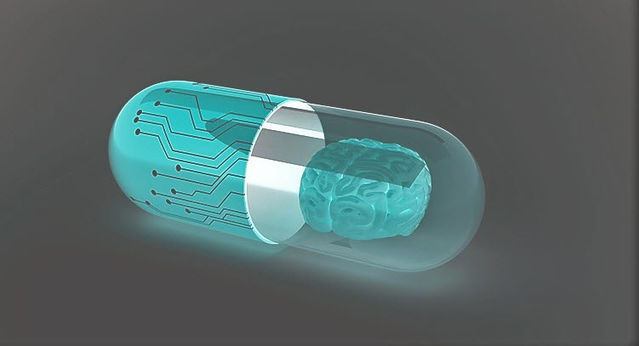Artificial Intelligence
How Artificial Intelligence Is Accelerating Life Sciences
AI in Pharmaceutical and Biotech Industry Sectors
Posted July 5, 2018

The drug development lifecycle is long and fraught with heavy risk — it takes a staggering 10 – 15 years on average, with ultimately only 12 percent of drugs in clinical trials gaining approval by the U.S. Food and Drug Administration (FDA) [1]. To put this in perspective, 22.7 percent of all global research and development spending in 2017 was in the healthcare industry, second only to 23.1 percent spent in the computing and electronics industry, yet the product lifecycle is longer, and costs are much higher [2]. For example, the original iPhone took two and a half years to develop from concept to launch, and an estimated $150 million spent in research and development [3]. In contrast, the average cost of new drug and biologics is $2.87 billion when factoring in the post-approval research and development costs, according to figures released in May 2016 by The Tufts Center for the Study of Drug development (CSDD) [4]. For pharmaceutical companies that have launched more than four drugs, the median cost is closer to a staggering $5.3 billion according to analysis by industry expert Matthew Herper of Forbes [5]. Artificial intelligence can greatly reduce the time companies spend in research and development for new drugs.
Venture Capital and Private Equity AI Startups in Life Sciences
A number of forward-thinking venture capital companies and investors have placed early bets on AI startups in life sciences. Many of the burgeoning AI in pharma and biotech are in the drug discovery phase. AI can significantly reduce the time it takes to discover new drugs which amounts to real cost savings. AI is used in drug discovery and development in a number of ways:
- Organic synthesis and design
- Scoring synthetic complexity
- Automation of molecule design
- Predicting organic reaction outcomes
- Computer-aided synthesis
- Computer-assisted retrosynthesis based on molecular similarity
- Predict drug performance in testing
- Discover off-label use
- Predict toxicity prior to clinical trials
- Personalized medicine
For example, startup Atomwise deploys patented structure based convolutional neural networks to predict the binding of small molecules to proteins, thereby accelerating the drug discovery process. Its AtomNet solution enables the analysis of 10 to 20 billion chemical compounds daily, reducing the time for discovery and optimization process from years to weeks. Atomwise is funded by Y Combinator, OS Fund, Khosla Ventures, Tencent Holdings, Baidu Ventures, Dolby Family Ventures, and other investors according to Crunchbase.
Palo Alto-based AI biopharmaceutical twoXAR, with backing by OS Fund, Andreessen Horowitz Bio Fund, CLI Ventures, Stanford-StartX Fund, and Softbank Ventures, provides an AI-driven drug discovery platform to identify in vivo testing with predictive technology.
AI startup Insilico Medicine, founded in 2014 by Alex Zhavoronkov, (backed by Pavillion Capital, WuXi appTec, Peter Diamandis’ BOLD Capital, and others), uses generative adversarial networks (GANs) for new molecule drug discovery, biomarker development, and aging research [6].
London-based BenevolentAI aims to deploy AI across the entire R&D process, not just the drug discovery phase. As of April 2018, the AI startup is backed with $200 million from family offices, Woodford Investment Management, and other investors [7]. It has a Parkinson’s drug in Phase 2B clinical trials, and an ALS medication planned for trials in five years [8].
AI Investments by Global Pharmaceutical Giants
The top 15 pharma companies ranked by 2017 revenue according to FiercePharma are Johnson & Johnson ($76 billion), Roche ($54 billion), Pfizer ($53 billion), Novartis ($50 billion), Sanofi ($41 billion), Merck & Co. ($40 billion), GlaxoSmithKline ($39 billion), Bayer ($29 billion), AbbVie ($28 billion), Gilead Sciences ($26 billion), Eli Lilly ($23 billion), Amgen ($23 billion), AstraZeneca ($23 billion), Teva ($22 billion), and Bristol-Meyers Squibb ($21 billion) [9]. Here are a few examples of how the top three companies on this list are incorporating artificial intelligence:
Johnson & Johnson
Johnson & Johnson Innovation’s life sciences has an incubator called JLABS. Its resident startups with AI technology include Analytics 4 Life [10], WinterLight Labs [11], A2A Pharmaceuticals, Envisagenics, Fited, Human Microbiology Institute, and Savor Health [12].
Roche
Precision medicine company GNS Healthcare announced a collaboration with Roche subsidiary Genentech to discover and validate new oncology drugs and patient response markers [13].
Pfizer
Pfizer is collaborating with IBM Watson Health for Drug Discovery, to assist in immuno-oncological research and development [14]. IBM Watson Health for Drug Discovery is an AI solution that contains data from four million patents, 25 million Medline abstracts, and over a million full-text medical journal articles that are updated regularly.
Pfizer and XtalPi (backed by Google, Sequoia China, and Tencent) are in collaboration to combine quantum mechanics and AI machine-based learning to predict pharmaceutical properties of molecular compounds for drug discovery and development [15].
There have been recent developments in AI drug discovery solutions in top academic institutions. A Stanford research team developed a method for drug discovery with “one-shot learning” that greatly reduces the amount of data required to identify new drugs [o]. In May 2018, researchers at MIT formed the Machine Learning for Pharmaceutical Discovery and Synthesis consortium with industry partners that include Pfizer, Lilly, Bayer, BASF, Amgen, WuXi, Sunovion, and Novartis [16].
The pharmaceutical and biotech industries are ripe for disruption by artificial intelligence. U.S. biopharmaceutical companies spend $75 billion in research and development annually [17]. Startups and corporate behemoths alike are investing in artificial intelligence technology solutions in order to shorten drug development time, gain advantage over the competition, and stay viable in the future.
Copyright © 2018 Cami Rosso All rights reserved.
References
1. PhRMA. “2017 Biopharmaceutical Industry Profile.” Accessed July 4, 2018. http://phrma-docs.phrma.org/industryprofile/pdfs/2017IndustryProfile_Br….
2. Statista. “Percentage of global research and development spending in 2017, by industry.” Accessed July 4, 2018. https://www.statista.com/statistics/270233/percentage-of-global-rundd-s…
3. Nieto-Rodriguez, Antonio. “Is the iPhone the best project in history?” CIO. Nov 3, 2017.
4. DiMasi, Joseph A., Grabowski, Henry G., Hansen, Ronald W. “Innovation in the pharmaceutical industry: New estimates of R&D costs.” Journal of Health Economics. May 2016.
5. Herper, Matthew. “How Much Does Pharmaceutical Innovation Cost? A Look at 100 Companies.” Forbes. Aug 11, 2013.
6. Hale, Conor. “Pfizer launches new collaboration with XtalPi for AI drug modeling.” FierceBiotech. May 9, 2018.
7. Lunden, Ingrid. “BenevolentAI, which uses AI to develop drugs and energy solutions, nabs $115M at $2B valuation.” TechCrunch. Apr 18, 2018.
8. Ibid.
9. Sagonowsky, Eric. “The top 15 pharma companies by 2017 revenue.” FiercePharma. May 15, 2018.
10. Johnson & Johnson (2017, May 11). Johnson & Johnson Innovation Announces 40+ Resident Companies now at JLABS @ Toronto [Press Release]. Retrieved from https://jlabs.jnjinnovation.com/news/johnson-johnson-innovation-announc…
11. Johnson & Johnson (2018, Jan. 5). Johnson & Johnson Innovation Champions Leading Edge Science with 15 new Collaborations with Potential to Impact Patients’ Lives [Press Release]. Retrieved from https://www.jnj.com/media-center/press-releases/johnson-johnson-innovat…
12. Johnson & Johnson (2018, June 21). Johnson & Johnson Innovation Opens JLABS @ NYC in Collaboration with New York State and the New York Genome Center [Press Release]. https://jlabs.jnjinnovation.com/news/johnson-johnson-innovation-new-yor…
13. GNS Healthcare (2017, June 19). GNS Healthcare Announces Collaboration to Power Cancer Drug Development with REFSTM Causal Machine Learning and Simulation AI Platform [Press Release]. Retrieved from http://www.gnshealthcare.com/news/gns-healthcare-announces-collaboratio…
14. Pfizer (2016, December 1). IBM And Pfizer To Accelerate Immuno-Oncology Research With Watson For Drug Discovery [Press Release].
15. Altae-Tran, Han. Ramsundar, Bharath, Pappu, Aneesh S., Pande, Vijay. “Low Data Drug Discovery with One-Shot Learning.” American Chemical Society. April 3, 2017.
16. Koperniak, Stefanie. “Applying machine learning to challenges in the pharmaceutical industry.” MIT News. May 17, 2018.
17. PhRMA. “2017 Biopharmaceutical Industry Profile.” Accessed July 4, 2018. http://phrma-docs.phrma.org/industryprofile/pdfs/2017IndustryProfile_Br….




